- Home
- Anthony Burgess
A Long Trip to Teatime Page 6
A Long Trip to Teatime Read online
Page 6
A very old lady just in front of Edgar said: ‘What was it? I didn’t hear it, deaf as a post I am.’ And many people said: ‘E. E. That’s what it is, E. The note E.’
‘Oh, that’s all right,’ she said. ‘My name’s Doreen, so I don’t have to stay.’ And off she went, and many others went with her. Edgar didn’t understand. He said to a small fat man who was chewing what looked like long black bootlaces:
In the centre of the square, which was shaped like a circle, there was a fine big statue of a man on horseback, and this statue seemed to be conversing, with many shakes and nods of his metal head, to a man in clown’s costume (was he a member of the Edenborough Revue troupe?).
‘I just don’t understand.’
‘Simple enough,’ said this man, chewing. ‘Those whose names don’t begin with an E just goes. Just goes. Me, I’m of the name of Edward, so I stays. Listen.’ For the band had started to play again. It gave out two notes this time:
‘And that means I stays,’ said the man. ‘An E and a D, and me being of the name of Edward. What’s your name then, sonny?’ Edgar told him. ‘Why then, you stays too.’ And now the band gave out three notes. The square was emptying fast, and those who were leaving were smiling with relief. The three notes were:
‘An E and a D and a G,’ said the chewing man. ‘Well, that lets me out, me being of the name of Edward, which is an E and a D and a W. What did you say your name was, then?’ Edgar told him again. ‘Well, then that’s an E and a D and a G, like what they just played. Good-bye and the very best of luck.’ And he went, the bootlaces he was chewing (probably liquorice) hanging from his mouth and waving in the wind. By now the square was almost empty, but the tourists were still clicking away with their cameras. Edgar called to a young man standing about a hundred yards from him:
‘What is your name, sir?’
‘Me?’ said the young man. ‘Edgbaston, that’s what my name is. And that one over there – I know him well, we eat at the same fried trotter shop, on Eusebius Street it is, and very good value for the money – that one is called Edgeware. Edgeware Thackerwood, a bit of a mouthful. His mother and father were fond of riding the buses, you know. Ah, now we shall know, now we shall really know.’ For the conductor had raised his stick, and the band, with the drums rolling beneath, crashed out with:
‘Lets me out, that does,’ said the man called Edgbaston. ‘And old Edgeware too. Edgy!’ he called. The man called Edgeware Thackerwood was gloomily reading a bit of old newspaper. He looked very much like Mr Gladstone of the Eden-borough Revue. He turned when he was called, nodded, and went off, Edgbaston following. Everybody was going off, so Edgar thought he would go off too. But the clown bounced towards him, crying:
‘Didn’t you hear the music? E and D and G and A. You have the look of a young fellow that fits in all right there. What’s your name then?’ Edgar told him. At once the clown roared it aloud, and there was a great noise of cheering, while the band began to play ‘SEE THE CONQUERING HERO COMES’. The clown cried: ‘Edgar! Edgar!’ and the onlookers on the rim of the square, and the tourists with their cameras at the windows, joined in with a cry of ‘Edgar!’ And then a chorus of very pretty girls came on in a cart pulled by two old horses, while the band played a new tune, one that seemed to have been written for Edgar’s own benefit, and the girls sang very sweetly:
‘E and D and G and A
And add an R to that.
Edgar is the name you say,
You say and sing it every day,
But do not sing it flat.
E and D and G and A
Make quite a pretty tune.
But though you cannot sing the R
It’s pleasant on a small guitar
Beneath a Spanish moon.’
While the singing was going on, Edgar was being garlanded with the most beautiful sweet-smelling flowers, of all the colours of the Erckmann or Eridanian rainbow – malpacket, lorenzo, elia, essene, williams, esplandian and pythagoras. Then Edgar found himself being lifted on to strong shoulders of men in white tracksuits and being borne off he knew not whither. He called to the capering clown:
‘Where? Where? Where?’
But there was no reply, except from the band, which crashed out a very strange-sounding fanfare on the first four letters of his name (try it on the piano or the electric organ or the espriella, if you have one. But if you have a band sitting doing nothing in the cellar playing cards all day long, give them all a good clip on the ear, make them tune their instruments, and then have them crash it out f f f, which means fortissimo, which means very very loud):
Edgar could hardly see where he was being taken, being so smothered in flowers, but he soon found himself, to loud cheers and band-noises, being carried inside a big cool building through a great open doorway, and then he was plonked gently enough down on a chair and the chair was at a long table, and the table was covered with the following marvellous eatables and drinkables:
The white-tracksuited men who had brought Edgar in now bowed themselves out, and Edgar was entirely on his own. The room was bare but full of doors, and it smelt vaguely of mint and lilies.
An esto perpetua pie, very hot, with a jug of etzel cream next to it.
A fried Flemish sompnour, with euphelian potatoes.
Three singing euphrosynes, garnished with demogorgons and plain raw shredded cabbage.
A piece of beef done in the brasenose manner, stuck all over with little savoury pieces of knossos.
Braised slices of jocelyn in a rich cogglesby sauce.
A cold rice pudding.
Caladbolgs, very light and airy, with little stewed caliburns and caledvwlchs on toast done in the Excalibur style.
A great silver dish crammed with huibrechts and eyrbyggjas, all steaming hot.
Tea. Great Exhibition tea. Exeter tea (sometimes called Leofric leaf). Alfoxden tea. Lob-lie-by-the-fire tea. Jan of the Windmill tea. Ex pede Herculem tea. Examination of Sir William Hamilton’s Philosophy tea. Evangeline tea. Eustace Diamonds tea. Eureka tea. Golden Legacie tea. Tea.
The white-tracksuited men who had brought Edgar in now bowed themselves out, and Edgar was entirely on his own. The room was bare but full of doors, and it smelt vaguely of mint and lilies. He had just taken a delicious huibrecht, the pastry light as the kiss of spring and the filling of hot waynflete jam pungently sweet, and was about to pour himself out a mug of Euphorion tea when one of the doors opened and two quiet figures came in. Edgar’s mouth, still full of half-chewed huibrecht, opened nearly to the limit at the sight of them. One was a sort of lady and the other a sort of gentleman. But the gentleman spun round to show he had a face at the back of his head as well as at the front, and the lady seemed to be hopping on one leg. He couldn’t actually see the leg, which was hidden by a long flowery skirt, but he assumed, from the jerkiness of her motion towards him, that she was a one-legged lady. She said:
‘So sorry to interrupt your meal, my dear boy, but our entrance is part of the proceedings. My name is Mrs Echidna, and this is my son, poor boy, whom unkind persons insist on calling the Blatant Beast.’ Her son, both of whose faces were sad and handsome, sadly nodded. He wore beautiful clothes of red velvet and twirled a short rolled umbrella in his left hand. His manner of progression involved many graceful twistings and turnings, so that nobody, apparently, could accuse him of hiding one of his faces.
Edgar could not speak. He merely made noises.
‘So,’ said the Blatant Beast, ‘when you’ve finished eating that delicious-looking eyrbyggja, we will be on our way. The car is waiting outside.’
‘Wherewherewhere?’ Edgar spluttered.
‘Oh, to the Castle,’ said Mrs Echidna. ‘You are, dear boy, by way of being our prisoner.’
CHAPTER VI
In the Castle
EDGAR KEPT saying to himself: ‘It’s a dream a dream that’s what it is it’s a dream I shall wake up soon and everything will be all right meanwhile it’s a bad bad dream a nightmare’ – which might s
eem to you a sensible thing to be saying, but the fact is that if you dream you are dreaming you may easily dream that you’re waking up, and what you wake up to (in your dream, that is) is only another dream, and that could well be worse than the other one, if you see what I dream, I mean mean. Saying all this to himself, he found himself being led quite gently to a great shining motor-car (an Estrildis 90, very rare and very expensive), with a dwarfish-looking driver wearing a uniform and a peaked cap. Newspaper photographers took pictures, and Mrs Echidna and her son kindly posed smiling for these, and Edgar tried to scream: ‘Get me out of here!’ but no sound issued from his lips. There were also masses of tourists, being held back from getting too close by a cordon of charming policemen, and these clicked and whirred away with their still and movie cameras.
‘It’s all for the tourist trade,’ Mrs Echidna said. ‘A terrible bore, of course, but one has to earn a living somehow.’ Then they got into the car, the Blatant Beast sitting at the front with the driver. This meant that he could talk to Edgar without turning round. As the car sped off amid the cheers of the crowd, the Blatant Beast said to Edgar:
‘The face now looking at you and talking to you is called Rearface, while the other one, which is looking ahead and addressing the driver occasionally (his name, by the by, is Alberich), is called Foreface. I am usually called BB. All clear? Good.’
‘What,’ said Edgar in a fearful choking croaking whisper, ‘are you going to do me?’
‘Oh, you’re not to worry,’ said Mrs Echidna. ‘They all escape, and then the newspapers have big headlines saying so, which also is supposed to be good for the tourist trade. When I say all escape I perhaps exaggerate a little. BB and I are quite willing to put everything which will enable you to escape at your disposal, but there’s always the problem of my father, who’s one of the old school. He doesn’t believe in escaping, ah no. He believes in eating alive, bloodthirsty old cannibal as he is, if he’ll forgive my saying so.’
‘He’s in Estotiland,’ said BB’s Rearface. ‘He’ll neither forgive nor not forgive, seeing that he’s not here to hear.’
‘Oh, but he’s so quick about everything,’ sighed his mother. ‘Turn your back for an instant – me, I mean, not you, of course – and lo and behold he’s there.’ Edgar now saw that she did not after all have a single leg. She had instead a very powerful tail, muscular as a kangaroo’s or perhaps a python’s (though a python is all tail, except for its head – rather like a coin when you come to think of it), and Edgar remembered what the boatman had told him, so long ago it seemed: Like a big snake from the waist down. He should have felt more fearful than ever, but he did not: he was just full of pity and admiration for a lady who had to get around by balancing on the end of her tail. He looked at her face: a nice face, with big round spectacles and ear-rings in the shape of Maltese crosses, and a little portrait of her son BB in a cameo brooch. The world was a hard place for everyone, and monsters were no exception. He now said:
‘What’s the name of your father, and er er what does he -’
‘Look like?’ said BB’s Rearface. ‘Grandfather is just big, that’s all. Just very very very very big. A giant you could call him.’ And then the Foreface, which Edgar of course could not see, addressed Alberich the driver: ‘A giant, yes, Alberich?’
‘Most is giants to the likes of me,’ Alberich said. ‘But that he’s pretty big I’ll not go so far as to deny.’ And Rearface nodded to Edgar, as to indicate that what Alberich said made very good sense indeed.
‘And what’s his name?’ again asked Edgar.
‘Changes it a great deal,’ Mrs Echidna said. ‘According to who’s in the news as having done something really bad. Earthquake Strikes Nicaragua. That’s a what, not a who, but it makes no odds to my father. Mr Earthquake. He’s a busy man. He’s behind a lot of the bad things.’
‘Well, let us hope that Estotiland keeps him busy for a time,’ said BB-RF. ‘Ever been there?’ he said conversationally to Edgar. ‘Interesting. A kind of Russian America or American Russia. Imagine that America has turned into Russia and Russia has turned into America and you have a good idea what it’s like.’ Edgar tried hard to imagine this but soon gave it up. He concentrated as best he could on the landscape outside the car window: lakes, volcanoes, forest, pig-pasture, the occasional village where they seemed to be making artichoke and beetroot wine. It seemed a long way to the -
Edgar could see what looked to him like a quite ordinary old house though a big one, with towers of different heights all stuck on to it – like a bunch of church candles that had been lighted at different times and then all put out at the same time,
‘Ah, here it is – the Castle,’ said BB’s RF. ‘Just coming to the hill now. Imposing, wouldn’t you say? Terribly expensive to keep up, of course, but the Lord Mayor and Corporation of Edenborough help. It’s all tourist trade, you know. They come and see the place at week-ends, paying an entrance fee, of course, and also on public holidays like Aram, Etruria and Till Eulenspiegel’s Anniversary. We allow them to see just a little, no more, but that seems to satisfy them so long as they can take photographs. People,’ he said with gloom, ‘are easily satisfied.’
Edgar could see what looked to him like a quite ordinary old house though a big one, with towers of different heights all stuck on to it – like a bunch of church candles that had been lighted at different times and then all put out at the same time. To add to the candle effect, wisps of smoke seemed to be arising from the tops of the towers, but this was probably coming from hidden chimneys. There were also pennants flying in the quite strong wind, and there was a moat and a flimsy-looking drawbridge. They now drove up to the drawbridge and the driver Alberich blasted a little tune on his three or four horns. The drawbridge was let down with a good deal of creaking, and some of the cables seemed to be very frayed. So they drove over the moat, and the drawbridge-operator greeted them with low bows and a long smile of few teeth. He seemed to be Alberich’s brother or cousin. He settled down to quite a lengthy talk with Alberich.
‘How was it then in the town?’
‘All right. We’ve got the new one in the back here.’
‘No rain? No snow? No weatherly extravaganzas?’
‘As I always tell you, the weather’s the same there as it is here.’
‘In a great big town like that? Nonsense. It stands to reason they can afford better weather than that that we have.’
‘But I’ve told you before, you don’t pay for weather.’
‘And I’ve told you before that you can’t lay on one of these big thunderstorms without digging pretty deep in the pocket. Why, the lightning alone must cost a small fortune, quite apart from the thunder.’
They now drove up to the drawbridge and the driver Alberich blasted a little tune on his three or four horns. The drawbridge was let down with a good deal of creaking, and some of the cables seemed to be very frayed.
‘Look,’ said BB wearily, ‘we’ve had enough of all this, Bolingbroke. Alberich, drive on.’
‘But he’s got to be convinced, sir. He never seems to learn. Paying for weather, indeed.’
The creature called Bolingbroke first shook with anger and said: ‘Everything has to be paid for, that’s laid down, that is.’ Then he became calm and smiling and said: ‘I’ll admit that when it rains stray cats and stray dogs there’s no money involved. Giving them away they are, in a manner of speech. But sometimes you get real pedigree animals coming down – Persian cats and German shepherd dogs – and those cost a pretty penny, I can tell you. Bless you, it’s all ignorance, but you’ll grow out of it in time.’
‘Drive on, Alberich,’ said BB’s two faces for greater volume. They drove on into the courtyard, and then the passengers got out, while Alberich drove further on, presumably to a garage.
‘Well,’ said Mrs Echidna, I suppose you’ll want to see your room.’
Edgar found himself, and them, in a great entrance hall with a log fire burning in the huge fireplace, with pictures
of ancestors and relations on the walls – he particularly noticed the Sphinx of Egypt – and ancient rusty weapons hanging between them – all too blunt, he thought, to cut butter when it was hot. From one of the many doors a man in a striped waistcoat appeared, whom Edgar took to be a sort of butler. He again seemed to be a brother or cousin of Alberich, judging from his appearance, and he came in grumbling.
‘Ah, Etheredge,’ BB’s Foreface said, ‘so there you are.’
‘Well, it’s certainly me,’ Etheredge growled, ‘and I’m certainly not nowhere else. What’s your pleasure, not that it matters much?’
‘Our pleasure,’ said Mrs Echidna in ringing tones, ‘is that you escort this young gentleman to his room. At once.’
‘Hasn’t got no luggage,’ said Etheredge. ‘Hasn’t got much of anything, I’d say, getting himself kidnapped and brought here. No sense, that’s certain. Well, you’d better come along of me, young shaver, and I’ll show you what’s what.’
‘Supper,’ said BB, ‘will be in one hour’s time.’
‘Three hours, more like it,’ said Etheredge. ‘The cat ran off with the fish and the fox with the chicken. Cook’s sitting there, wondering what to do. I told her to make pancakes even though it’s Wednesday. She’s thinking about it.’ Then he made a rough come-with-me gesture with his head at Edgar.
Edgar was led up the fine wide stairs to a corridor full of doors. Everything had a smell of damp breadcrumbs. Etheredge grumbled all the time – about the pains in his feet, about his creaking bed, about the weather (sometimes too much rain, sometimes not enough), about the hard work which being a butler entailed. At length he pushed open a door and there was Edgar’s room. Edgar gasped when he saw it. It held nothing except a chair, a table, a kind of television screen, and a sort of trap-door in the floor. ‘There’s no bed,’ said Edgar.

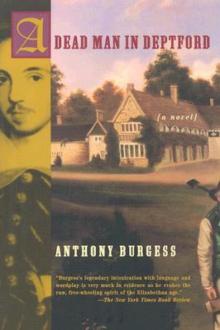 A Dead Man in Deptford
A Dead Man in Deptford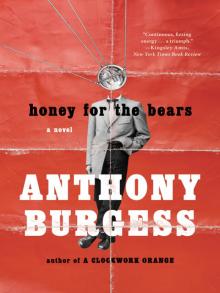 Honey for the Bears
Honey for the Bears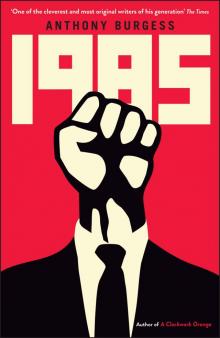 1985
1985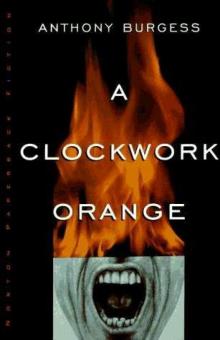 A Clockwork Orange
A Clockwork Orange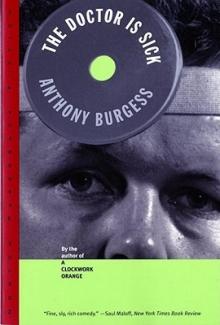 The Doctor Is Sick
The Doctor Is Sick Earthly Powers
Earthly Powers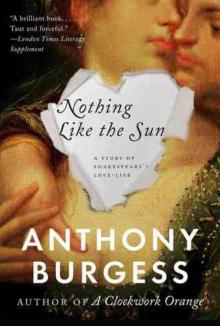 Nothing Like the Sun
Nothing Like the Sun Collected Poems
Collected Poems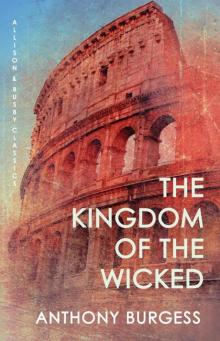 The Kingdom of the Wicked
The Kingdom of the Wicked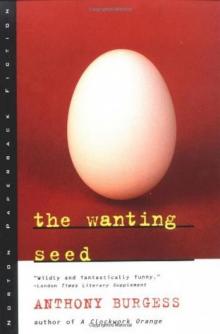 The Wanting Seed
The Wanting Seed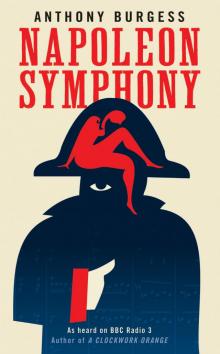 Napoleon Symphony
Napoleon Symphony The Malayan Trilogy
The Malayan Trilogy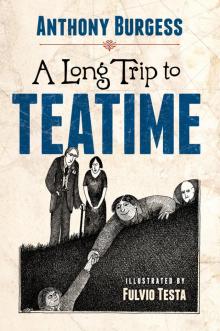 A Long Trip to Teatime
A Long Trip to Teatime Enderby Outside
Enderby Outside M/F
M/F The Complete Enderby
The Complete Enderby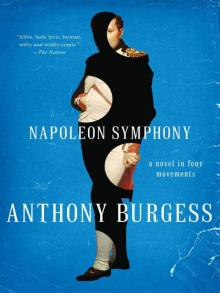 Napoleon Symphony: A Novel in Four Movements
Napoleon Symphony: A Novel in Four Movements Enderby's Dark Lady
Enderby's Dark Lady The Clockwork Testament (Or: Enderby 's End)
The Clockwork Testament (Or: Enderby 's End) ABBA ABBA
ABBA ABBA A Clockwork Orange (UK Version)
A Clockwork Orange (UK Version)